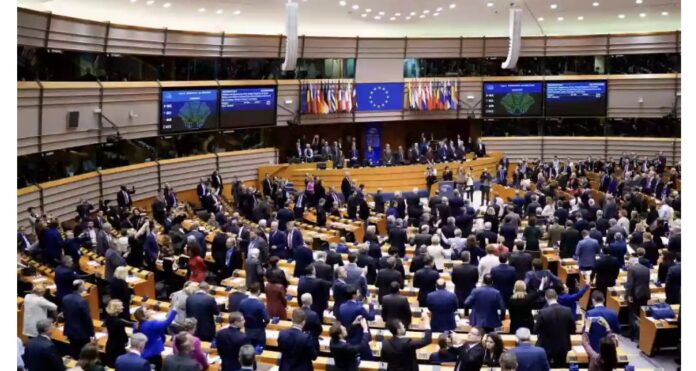The European Parliament approved the European Act of Media Freedom Act (EMFA) on March 13, according to the Presrellis on the website of the European Parliament.
The document was supported by 464 MEPs, 92 parliamentarians opposed it, and 65 abstained from voting.
The act aims to protect journalists from pressure from the authorities, ensure the full editorial independence of the public media, ensure transparency of mediacy and reporting on advertising and financing, as well as protecting independent media from social networks.
According to the draft law, the authorities will be forbidden to press on journalists and editors to reveal their sources, including by detention, sanctions, searches in offices, or installation on their electronic software software devices for their electronic devices.
Significant fuses on the use of spy software were added to this. It will be possible only in some cases and subject to trial in the investigation of serious crimes for which a sentence in the form of imprisonment is provided. Even in these cases, the entities will have the right to find out after completion and will be able to challenge it in court.
In order to prevent the use of public media for political purposes, managers and board members must be selected for transparent and non -discriminatory procedures for a long time. They will not be released before the contract is completed, unless they no longer meet professional criteria.
Public media should be funded by transparent and objective procedures, and funding should be constant and predictable.
In order to ensure transparency of property, all news and information publications must publish information about their owners in the national database, even if they are directly or indirectly belonging to the state.
State Advertising: New Requirements and Media Protection in EU
According to the European Act of Media Freedom, the media is now obliged to report on state advertising and financial support, including funds from countries outside the European Union. The distribution of public funds should be transparent, proportional and non -discriminatory criteria. In addition, public expenditures for advertising should be accessible to the public, including a total annual amount and allocated funds for each publication.
Protection of Media Freedom from the influence of large online platforms
The act also provides mechanisms for preventing the cutting off of an independent media content with large online platforms such as Facebook, Twitter (now X) and Instagram. Platforms are obliged to notify the media about any removal or restriction of content and give them 24 hours for reaction. After receiving the response, the platform can delete or restrict content if it does not meet their conditions.
The media will also be able to go to the out -of -court conflict resolution authorities and turn to the European Council of Media Services, a new regulator of national media in the EU.
Reaction and evaluation
The International Organization "Reporters Without Borders" welcomes the adoption of the act, planning to carefully monitor its implementation. The European Commissioner for Values and Transparency, Vera Yourov, believes that this law sends a clear message to anyone who tries to undermine democracy.
A member of the Committee on Culture and Education, Sabina Vergeen, defines the approved act as an important step in protecting and maintaining the role of media as a business and suffering from democracy.
Ramon Strugarius from the Committee of Civil Liberties considers this law as a response to threats to the freedom of the press from different political regimes and emphasizes the importance of ensuring the protection of journalists in their professional activity.
The European Parliament emphasizes that by adopting this law, they respond to the expectations of citizens from the EU, expressed in the conclusions of the conference on the future of Europe:
- To implement legislation aimed at counteracting the threats of media independence and ensuring compliance with the EU competition in the media pro -perpetrator to prevent the formation of large mediamonopolies, as well as to ensure the diversity of the media and their independence from unlawful political, corporate and/or foreign intervention;
- Combating misinformation through legislative means and recommendations for online platforms and social media;
- Protection and support of free, various and independent media, as well as ensuring the protection of journalists.
Recall that on September 16, 2022, the European Commission adopted proposals for a new European Act of Freedom Media Freedom Act. Its purpose is to protect the pluralism and independence of the media and freedom of information in EU countries.
On October 3, 2023, the European Parliament adopted a resolution in support of the European Act of Media Freedom.
On December 15, the EU Commission, the European Council, the European Council and the European Parliament - have reached its prior political consent on the European Media Freedom Act. However, in relation to some issues, EU officials had contradictory views until the last moment.


